The document discusses how peak oil may lead to changes in political economy and enforcement of individual entitlements. It argues that the current liberal trade system relies on cheap fuel but rising oil prices could force changes. This may affect quality of life and promote changes to political and economic policies. The paper will examine whether perceived scarcity from peak oil leads to these changes or if changes stem from promoting human rights as defined by international law. It outlines some theories that will provide context and examines civilization goals of ensuring citizens' economic rights.
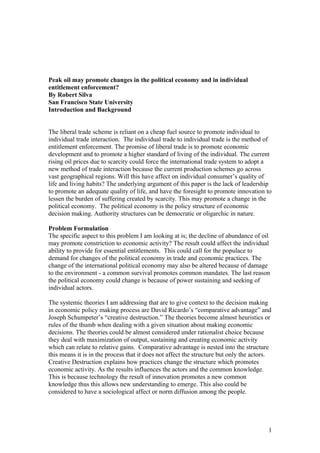
![Does the theory of David Ricardo’s comparative advantage1
hold true when
transportation cost that promotes trade denies the economic advantage of off shoring?
Must there be a comparative advantage in transportation to promote contemporary
productions networks? When the comparative advantage is lost does this mean the
structure changes and possible the political economy. This leads to the next logical
step is the market following the rational cycles of innovation to sustain the current
political economic institutional arrangement. Institutional is defined by codified
practices that promote predictable behavior to any given situation.
This is to address innovation of technological advance and Joseph Schumpeter
theory of creative destruction. 2
The theory of creative destruction could be the
method a comparative advantage is created through creating new technologies
through innovation that creates efficiency, thus creating a comparative advantage. The
example of innovation could be explained by the following. Early trade was based
camels and walking on land for example the old silk road. The wind power of sail
powered ships over the seas was the next transporting method. Then there was coal
powered trains over vast expansions of land. Then petro based airplanes in the air
over land and sea promoting efficiency in time and use of resources. Each innovation
propelled efficient transport and trade which lead to building of new infrastructures
and economic activity. As a fuel source declined so did economic activity that was
support by the fuel source. Efficient methods of travel and transport allow for deeper
integration thus affecting people’s quality of life, the sharing of culture and the
creation of a global cultural due to business activities that was enabled by cheap travel
and ability to trade. Each innovation expanded economic activity not just in the
creation of the infrastructure and the vehicles of trade but in other aspects of the
economy. Since oil is declining is there a sign of new technological advance taking
its place? Evolutionary economic changes do precede the last condition but emerges
from the situation before.3
This could assert that structure is not the only thing that
affects economic policy, but the agents could have affect on evolutionary steps of the
economy.
The migration of labor to produce the new innovation to spread the scientific
advancement causes the workforce to migrate to one mode of production to another.
As the old production structure fads away as the new production structure creates the
new technology. The workforce transfers to the next technological level of production
creating income and demand for the products being create thus economic activity and
increasing the quality of life to the populace apart of the trade regime. A trade regime
is a group of treaties and regulation that coordinate trade behavior between states. The
technology supports the trade regime because of market calculation defined by
comparative advantage. The technology promotes the comparative advantage of the
practices.
The current trade regime was based on liberal principles. The state creates the
environment for innovation, production and trade. The major actors in the liberal
1
David Ricardo’s Comparative Advantage” Theory of Comparative Advantage” http://iang.org/free_banking/david.html
2
Joseph Schumpeter, “Creative Destruction” From Capitalism , Socialism and Democracy, http:/ ew York: Harper, 1975) [orig.
pub. 1942],:/transcriptions.english.ucsb.edu/archive/courses/liu/english25/materials/schumpeter.html pp. 82-85
3
Joseph Schumpeter, The Theories of Economic Development An Inquiry into Profits, Capital, Credit, Interest, and the Business
Cycle, Harvard University Press 1961 copyright 1934 p.59
2](https://image.slidesharecdn.com/2210ebdc-6df5-4e80-9b3e-39a51d388b2c-160824003932/85/Myth_of_Peak_Oil-2-320.jpg)

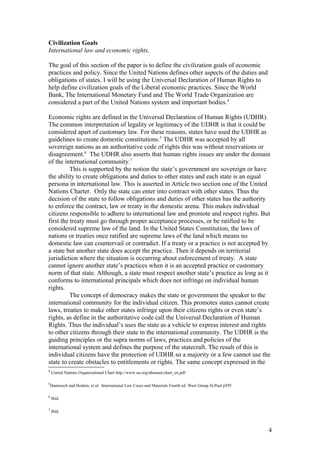
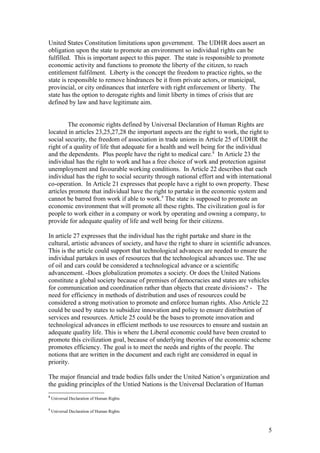
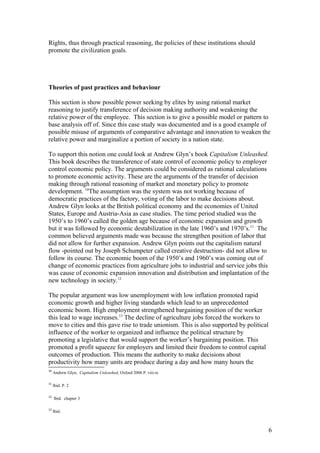
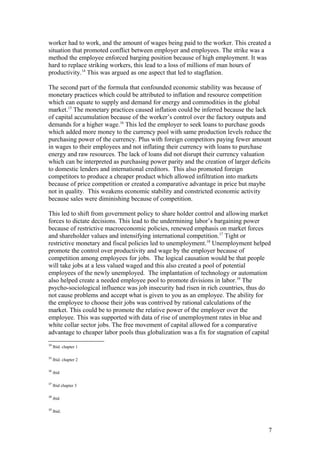

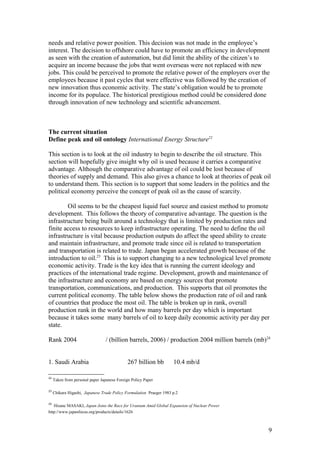
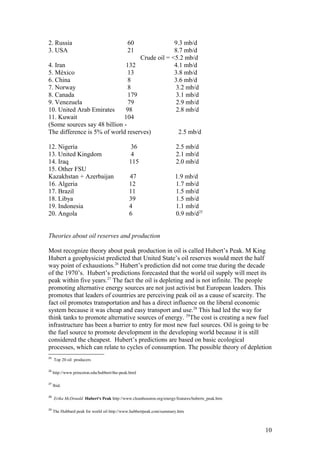
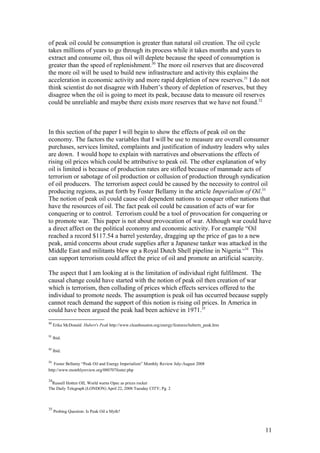
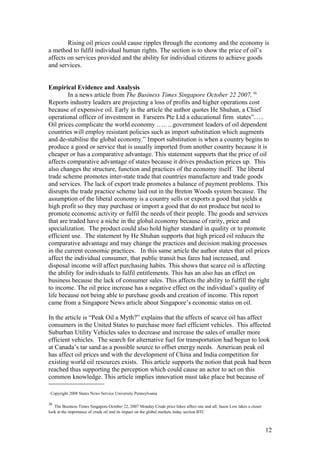
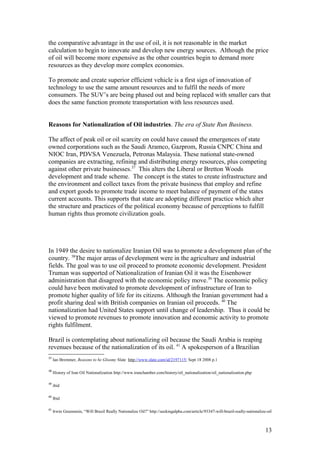
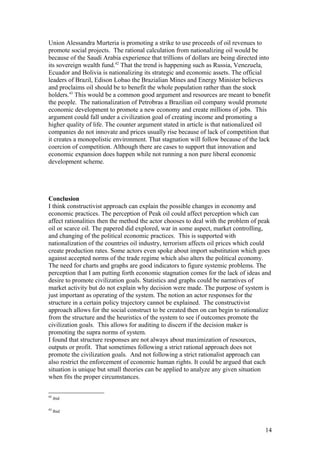
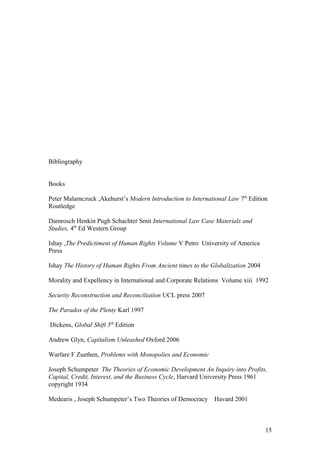
![David Ricardo’s Comparative Advantage” Theory of Comparative Advantage”
http://iang.org/free_banking/david.html
United Nations Organizational Chart http://www.un.org/aboutun/chart_en.pdf
Universal Declaration of Human Rights
United Nations Charter
David Ricardo’s Comparative Advantage” Theory of Comparative Advantage”
http://iang.org/free_banking/david.html
Joseph Schumpeter, “Creative Destruction” From Capitalism , Socialism and
Democracy, http:/ ew York: Harper, 1975) [orig. pub
1942],:/transcriptions.english.ucsb.edu/archive/courses/liu/english25/materials/schum
peter.html pp. 82-85
Erika McDonald Hubert's Peak
http://www.cleanhouston.org/energy/features/huberts_peak.htm
The Hubbard peak for world oil http://www.hubbertpeak.com/summary.htm
Foster Bellamy “Peak Oil and Energy Imperialism” Monthly Review July-August
2008 http://www.monthlyreview.org/080707foster.php
Russell Hotten OIL World warns Opec as prices rocket
The Daily Telegraph (LONDON) April 22, 2008 Tuesday CITY; Pg. 2
Probing Question: Is Peak Oil a Myth?
Copyright 2008 States News Service University Pennsylvania
The Business Times Singapore October 22, 2007 Monday Crude price hikes affect
one and all; Jason Low takes a closer look at the importance of crude oil and its
impact on the global markets today section BTC
16](https://image.slidesharecdn.com/2210ebdc-6df5-4e80-9b3e-39a51d388b2c-160824003932/85/Myth_of_Peak_Oil-16-320.jpg)